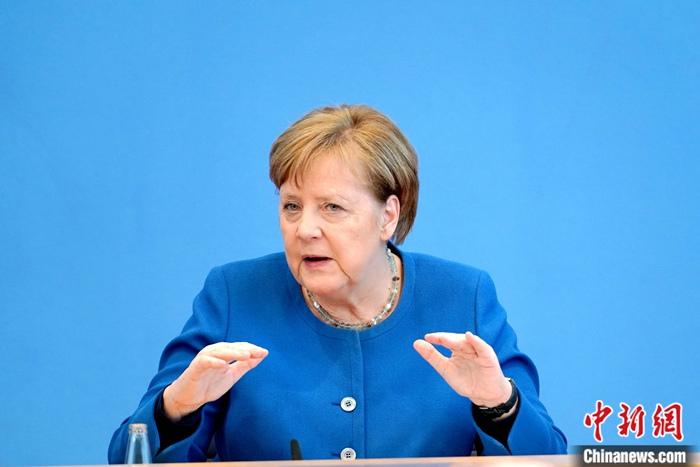China News Service, May 24, according to the European Union quoted the European Union News Agency, German Chancellor Angela Merkel and French President Macron unanimously initiated on May 18 to assist the EU member states that were hit hard during the new crown virus The economy hopes that the EU will launch a recovery fund plan worth 500 billion euros. The plan was officially rejected by EU member states Austria, the Netherlands, Denmark and Sweden on the 23rd, and the above-mentioned countries announced another set of economic recovery plans.
Data map: German Chancellor Angela Merkel. China News Service reporter Peng Dawei
According to reports, German Chancellor Angela Merkel announced on the 18th that she and Macron suggested that the EU help the EU member states to revitalize the economy by issuing a recovery fund. The fund needs to be approved by the governments and parliaments of the 27 member states of the EU, and will As the EU's regular budget and issued in the form of EU bonds in the 27 EU member states, the EU member states that suffered the most from the new coronavirus epidemic will have the right to apply for priority.
After the German-French initiative was announced, European Commission President Von Delaine welcomed the decision. The European Commission will announce its plan for the recovery of Europe next week; Italian Prime Minister Conte issued a statement on the 19th praising the German-French initiative as a good starting point The Spanish government, which was severely affected by the epidemic, also said that the initiative is a correct and important step taken by the EU in response to the economic crisis.
The governments of Austria, the Netherlands and other countries have stated that they do not support or intend to oppose this policy. Austrian Prime Minister Kurz (Sebastian Kurz) said that the Austrian government supports the European Union to provide loans to countries with severe epidemics to solve its plight, but opposed the issuance of relief funds to assist these countries.
On May 23 local time, Austria, the Netherlands, Denmark, and Sweden announced another set of economic recovery plans, refusing to accept the 500 billion euro recovery fund initiated by Germany and France, and opposed granting aid to member countries.
The report said that in a joint statement issued by Austria, the four countries of Austria, the Netherlands, Denmark and Sweden clarified their positions to other EU member states and recommended the establishment of a loan-type emergency recovery fund to avoid debt co-ordination, and The loan arrangement can only be temporary and one-off, and the sunset clause must be explicitly added after the first two years.
According to the German-French initiative, the European Commission will raise 500 billion euros from the capital market in the name of the European Union and provide it as EU budgetary expenditure to the regions and industries most affected by the epidemic. The funds will be repaid annually by the budget set by the EU, rather than individually by the beneficiary countries.
Italian Prime Minister Conte said that compared with the 500 billion euro recovery fund proposed by France and Germany, the European Commission may have done better. He reiterated Italy ’s position that the fund should support the countries hit by the epidemic in the form of non-refundable grants, rather than in the form of loans as insisted by the Nordic countries.
Conte emphasized that he looked forward to the European Commission President Von Delaine's more proposals from the European Commission at the May 27 meeting.
The report pointed out that the extent of the political and economic crisis caused by the New Crown Virus epidemic made Merkel aware that it was difficult to solve the problem of bail-out funds, and it was difficult to avoid the possibility of EU split. The four countries of Austria, the Netherlands, Denmark, and Sweden reject the German-French initiative and insist on loan relief, which will inevitably make the German-French initiative difficult to advance. The loan bailout case is expected to be difficult for southern European countries to accept. This move will inevitably further intensify the contradictions and deepen the cracks of the southern and northern European countries, and make the European Union's bailout case once again deadlocked. (Boyuan)

